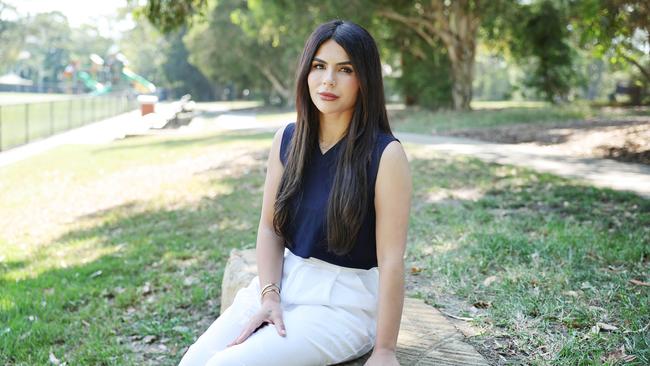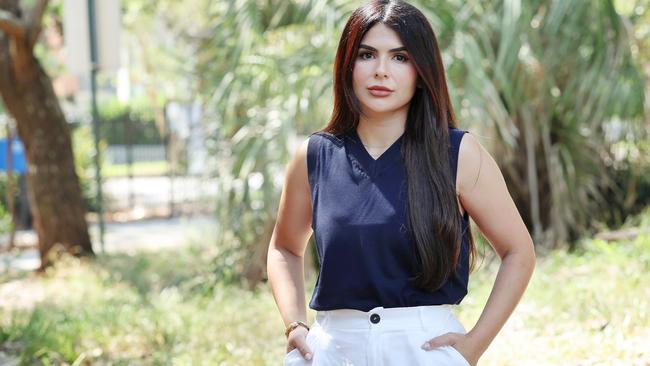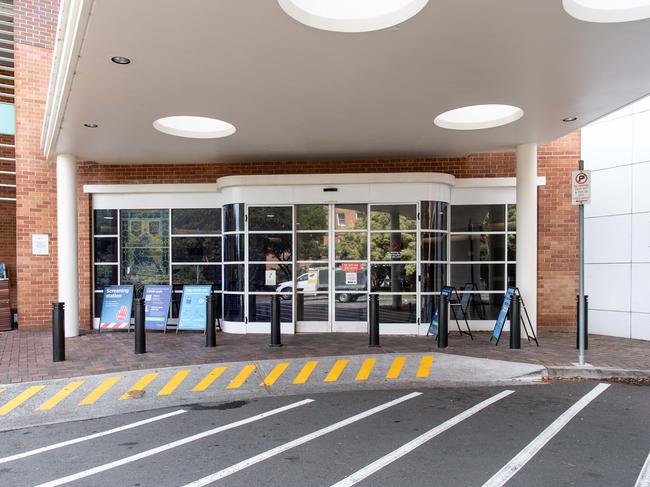Mum Kayla Itaoui shares horror post-partum psychosis battle after stabbing husband
A Sydney mum is sharing her battle with post-partum psychosis after a horrific incident involving her husband.
NSW
Don't miss out on the headlines from NSW. Followed categories will be added to My News.
When Kayla Itaoui was told she had stabbed her husband during an episode of post-partum psychosis, she fell to the ground of the hospital and sobbed.
She had no recollection of the incident, and spent two long months receiving treatment in hospital, after falling into a depression following the birth of her third child.
She’d never heard of post-partum psychosis until it impacted her, and remembers feeling helpless, out-of-control, and frightened.
It’s a rare mental health disorder that affects one in 1000 women after birth, which can have severe impacts on a mum’s thinking and behaviour.
In an exclusive interview with the Telegraph, Kayla – daughter of Sanity Music and retail boss Ray Itaoui – said, two years later, she and her husband Adam were stronger than ever.

While her “favourite thing ever” is being a mum, she revealed how she began suffering from postnatal depression after the birth of her youngest daughter in 2023.
When their baby girl was just four weeks old, she and Adam received the news she had a condition called corneal dystrophy, a genetic eye disorder.
“I would be googling her symptoms all night. I was sleep-deprived, worried, scared, and it sent me into a deep depression,” she said.
“I started isolating from my friends and family, I didn’t go out, I was crying everyday.”
She’d never experienced any depression and anxiety following the birth of her older girls, and became so depressed she feared she’d never come out of it.
“I knew it was really bad when we took the girls to the zoo. They were having fun, and I just couldn’t even bring myself to smile or laugh,” she said.
“I couldn’t find any joy in it, and that’s when I knew things had become really bad.”
She tried to take her life shortly after, and in the days and weeks following, began to experience psychotic delusions.

She walked into her neighbour’s home uninvited, thought people were talking to her through the television, and went on a religious rant. Her family became so worried they called an ambulance, and she was rushed to hospital.
She was involuntarily scheduled to the mental health unit at Concord Hospital in July 2023 for treatment, and after almost two weeks, was released for the day to see her daughters and husband.
During the visit, Kayla stabbed her husband and was charged, before she was again admitted for psychiatric care.
“I remember my mum and dad coming into the hospital and telling me what had happened a few days after,” she said.
“I remember bawling my eyes out and dropping to the ground. I just couldn’t deal with it or understand it.”

She spent the next eight weeks in hospital, unable to see her family, as she was treated for post-partum psychosis – a rare post-partum mood disorder, according to a clinical psychologist from the Gidget Foundation.
“PPP is diagnosed postnatally, where there is often a rapid and severe onset of symptoms that often occur within the first two weeks after birth,” the doctor said.
“The most severe symptoms can last two to 12 weeks, although it can take six to 12 months or more to feel more fully recovered, depending on severity of symptoms and response to treatment.”
The psychologist said getting help early was “key”, with delay in diagnosis posing significant risks for both the mother and her family.
“Any delays in identifying and treating PPP can lead to a longer and more complex episode, and significant safety risks for both the mother and baby. It is also essential that partners, friends and family members play a key role in both treatment and recovery,” she said.
“For pregnant women it’s uncomfortable to imagine such conditions happening, but the more knowledge people have, the more they can look after themselves or others if they suspect PPP is occurring.”

While Kayla had been charged with assault occasioning actual bodily harm, the charges were dismissed due to mental health, with a judge agreeing she was suffering severely with post-partum depression and psychosis.
Kayla told the Telegraph she and Adam were “stronger than ever”, labelling him her “biggest supporter”.
“He’s so supportive,” she said. “He knows how unwell I was and that it wasn’t me. It’s made me realise how much I love him.”
While it’s been almost two years since the incident, Kayla is still working to process and work through it – as well as urging any new mums to seek help if they feel unwell, or aren’t coping.
“Being told you’ve done these things that you have no recollection of, it’s horrendous, and very hard to explain and to accept,” she said.
“And then dealing with guilt of something you have no idea about, it’s hard.
“I urge mums if they notice anything different, or their family notices something, please seek help. It’s not shameful, it’s brave.”
While Kayla and Adam had planned to try for a fourth baby, her experience with post-partum psychosis ended that dream.
“It’s too scary and I am too worried about it happening again,” she said. “It’s sad but we have a beautiful family, so we are grateful for that.”
Do you have a story for The Telegraph? Message 0481 056 618 or email tips@dailytelegraph.com.au





